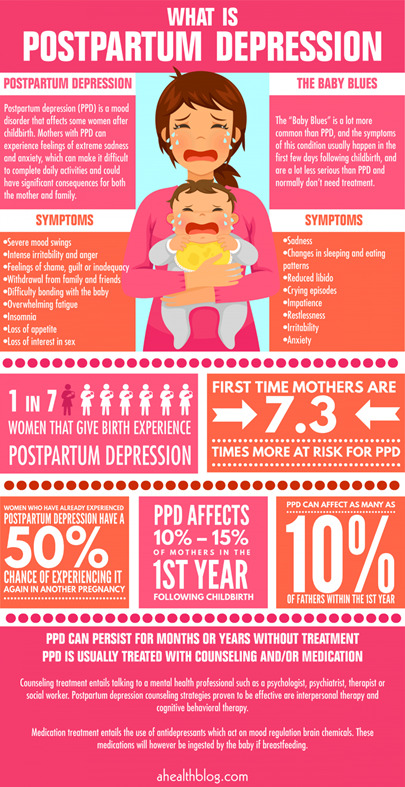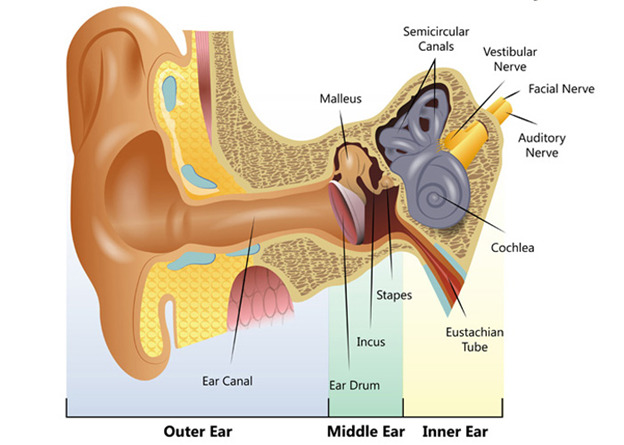Postpartum Depression
Since the plan for our doctoral project was to evalute and determine if postpartum depression (PPD) was present in mothers, we decided it's still important to explain why audiologists should be made aware of PPD signs/symptoms.
According to the National Institute of Mental Health, postpartum depression is a disorder that affects mood, causes sadness, anxiety, and exhaustion in women postnatally. Postpartum depression can appear days to months after birth, and can last up to months if left untreated. The worldwide prevalence in mothers is between 5-60.8%. The United States has the highest prevalence of postpartum depression in mothers amongst other developed countries.
During pregnancy, a woman’s hormones are changing and after childbirth, the hormone levels can quickly drop triggering mood swings. Some common signs of postpartum depression are: feeling hopeless, difficulty concentrating, lack of daily interests, sleep disorders, serious concerns about the baby, and thoughts of death and suicide. Studies show that about 20% of maternal deaths after birth are caused by postpartum depression. There are also a multitude of risk factors that can occur which include depression or anxiety before pregnancy, family history of depression or mental illness, having a baby with special needs, first-time mother or very young mother, lack of support, financial problems, and stress involving caring and managing a newborn. This type of depression can create an unhealthy environment for the development of the mother, development of the child, and development of that mother-child bond. This is why it is important for audiologists to be informed on PPD, because we can help these mothers seek treatment.
If a mother has postpartum depression but does not seek help, problems may arise to both herself and her child. Studies have shown that mothers who do not seek help can have weight problems, alcohol and drug use complications, poor social relationship problems, trouble breastfeeding, and persistent depression. The infant may be at risk too. The child has a higher risk of poor cognitive functioning, behavioral problems, emotional maladjustment, underweight, trouble sleeping, and low fine motor skills. It is important for audiologists to screen mothers for postpartum depression since we are typically the first professionals to see the mother and infant after birth.
Audiologists are the healthcare professionals who see newborn babies for a hearing evaluation if the baby failed their Universal Newborn Hearing Screening (UNHS) at the hospital. The process of the UNHS includes a trained nurse or other employee at the hospital who give an automatic hearing test on the baby at the hospital. The test can be administered to the infant at any point while the infant and mother are still at the hospital. Due to the infant being in amniotic fluid, there is an increased chance of fluid that could still be in the outer and middle ear space (refer to the image to the left), causing a false-negative hearing test result. A fail on the automatic hearing screener can be from either the fluid in the ear canal space, tester reliability, or there's an actual hearing loss that is present. It's important to note that the screener that the hospital uses doesn't show the type or severity of the hearing loss. Many UNHS protocols at the hospital will retest the infants hearing before they leave the hospital to see if the results have changed or if it's still showing not passing. If the results are still not passing, then the family will be given information to see a diagnostic audiologist who has the right equipment to determine if there is a hearing loss present and how severe it may be.
Usually, the baby and their parent or guardian will have a hearing evaluation appointment with an audiologist anywhere from about 1-20 weeks of age. During this appointment, the audiologist will gather a case history from the mom to determine if there was any pregnancy or birth complications, along with any history of hearing loss in the family and any other important medical information. Once the audiologist has received the information they need, they will begin evaluating the infant's hearing by doing a multitude of tests. The tests that will be completed will determine the integrity of the organ of hearing (also known as the cochlea), as well as the auditory nerve (refer to the image on the left). The results of these tests will give the audiologist an idea if the patient has normal hearing, a conductive hearing loss, or a sensorineural hearing loss. A conductive hearing loss tends to be a temporary loss due to fluid or some other pathology occurring in the middle ear space (refer to image on the left). A sensorineural hearing loss is a permanent hearing loss that affects the cochlea and the auditory nerve (refer to image on the left). The type of intervention that is done for infants with a conductive or sensorineural hearing loss all depends on the severity and the reason why the loss is there. It's important for audiologists to have a plan set in place so the infant doesn't experience delays in speech and language development.
Since the follow-up appointment to a failed hearing screening can be scheduled as soon as the first several weeks after birth, the audiologist may be the first healthcare professional to see the mother and determine if there is signs/symptoms indicating PPD. With that said, this makes audiologists a good healthcare professional to administer a PPD screening with the mother and make any necessary referrals depending on the result of the screening. The earlier PPD is diagnosed, the sooner a treatment plan can be determined allowing for the mom to get the help she needs in hopes of no longer experiencing symptoms of disconnect with her baby.


